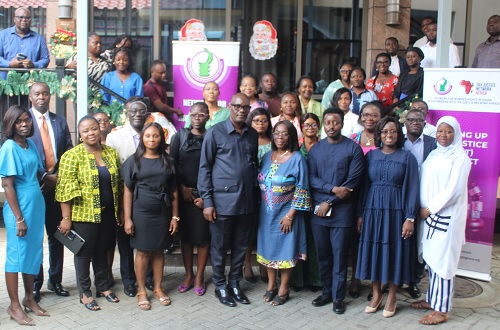
Experts advocate gender-responsive tax policies to promote equality
The Director of the Revenue Policy Division at the Ministry of Finance, George Winful, has underscored the need for gender-responsive fiscal policies and tax interventions to promote gender equality, economically empower women, and create an equitable society that leaves no one behind.
He highlighted that such policies and interventions could play a vital role in guiding policymakers to develop effective measures that address gender disparities.
Mr Winful was addressing a policy conference on taxation, gender equality and sustainable development organised by the Network for Women’s Rights (NETRIGHT), Ghana in collaboration with the Tax Justice Network Africa (TJNA).
The conference formed part of TJNA’s Phase three Scaling Up Tax Justice (SCUT III) project, which advocates fairer, progressive, and gender-equitable tax regimes that adopt a human-centred, rights-based, and pro-poor approach.
Held on the theme: “Taxation for Equity: Exploring Gendered Perspectives in National and International Tax Policies”, the event provided a platform for collaboration among policymakers, gender advocates, economists, civil society representatives, and international organisations to explore pathways toward more equitable tax systems at both national and international levels.
The event emphasised the need to integrate gender perspectives into tax policy development and address current issues in the global tax landscape, including the potential impact of the proposed United Nations (UN) Tax Convention.
Tax neutrality
Speaking on “Taxation and Equity: The Gendered Impact of Fiscal Policies in Ghana and Beyond”, Mr Winful noted that tax policy interventions could influence gender equality by generating revenue to support social spending and gender-focused initiatives.
“Tax policy interventions are used to influence gender equality in several ways, including generating revenue to support social spending and gender equality projects,” he stated.
He acknowledged that while taxes were traditionally viewed as neutral, there was a growing need to shift from the “mindset of neutrality” to account for gender disparities in taxation.
Mr Winful noted that despite data showing progress in women’s representation in leadership and politics globally, significant imbalances persist, disproportionately affecting women and girls.
He stressed that governments and businesses should work collaboratively to accelerate progress towards equal rights and opportunities for women.
Gender policies
The Chief Director at the Ministry of Gender, Children and Social Protection, Dr Afisah Zakariah, emphasised the need to integrate gender perspectives into tax policy development and implementation.
She stressed that for tax policies to be both effective and equitable, governments and policymakers should take into account the diverse economic realities faced by various groups in society, particularly the disproportionate burden of unpaid care work shouldered by women.
Dr Zakariah further urged stakeholders to support the implementation of the Affirmative Action Gender Equity Act 2024, emphasising its role in advancing the gender agenda and achieving gender parity, which is essential for effective national development.
